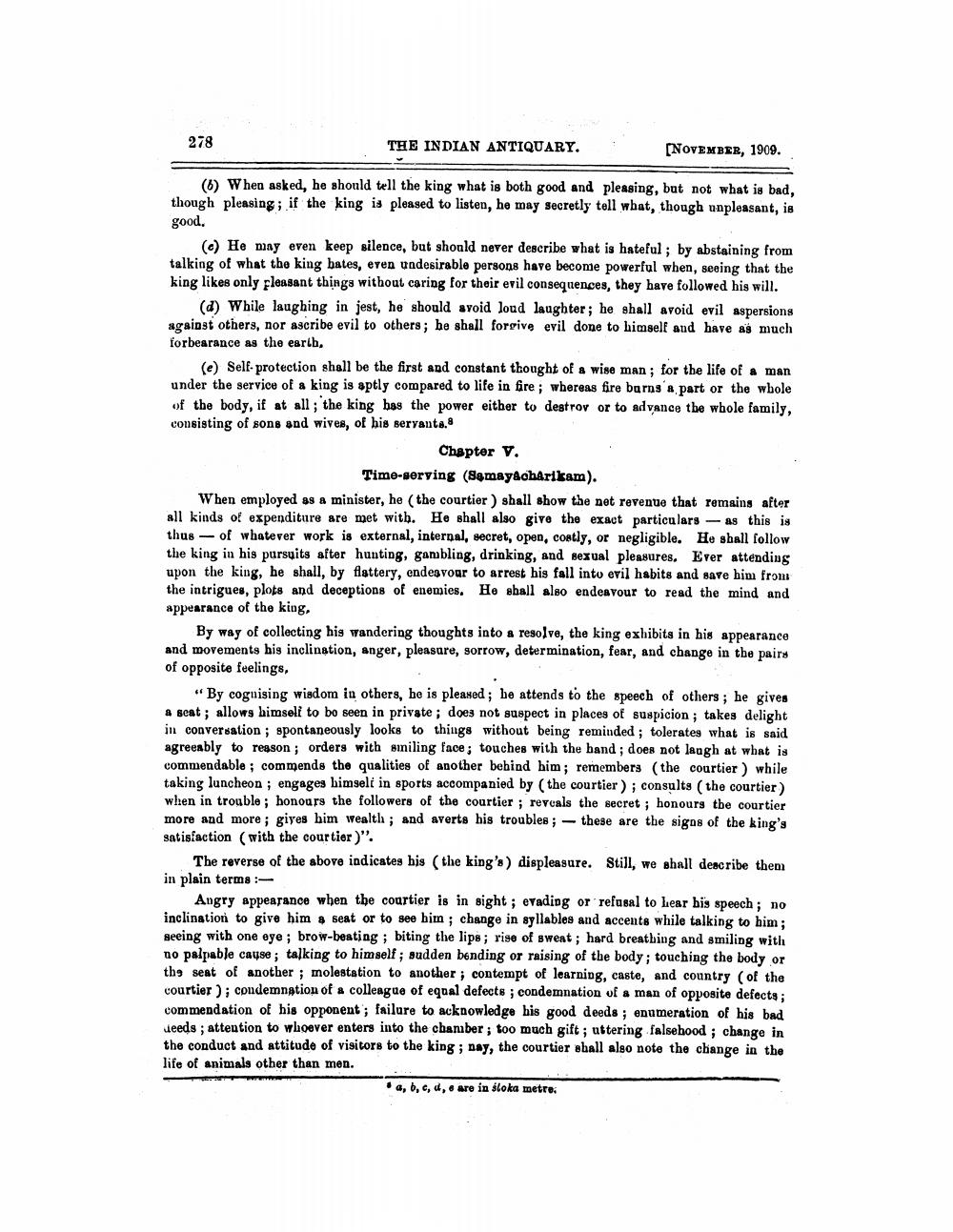________________
278
THE INDIAN ANTIQUARY.
(NOVEMBER, 1909.
(6) When asked, he should tell the king what is both good and pleasing, but not what is bad, though pleasing; if the king is pleased to listen, he may secretly tell what, though unpleasant, is good,
(6) He may even keep silence, but should never describe what is hateful; by abstaining from talking of what the king bates, even undesirable persons have become powerful when, seeing that the king likes only pleasant things without caring for their evil consequences, they have followed his will.
(d) While laughing in jest, he should avoid loud laughter; he shall avoid evil aspersions against others, nor ascribe evil to others; he shall forgive evil done to himself and have as much forbearance as the earth,
(e) Self-protection shall be the first and constant thought of a wise man; for the life of a man under the service of a king is aptly compared to life in fire ; whereas fire barns a part or the whole of the body, if at all, the king has the power either to destroy or to advance the whole family, consisting of sons and wives, of his servants.
Chapter V.
Time-serving (Samayacharikam). When employed as a minister, he (the courtier ) shall show the net revenue that remains after all kinds of expenditure are met with. He shall also give the exact particulars - as this is thus - of whatever work is external, internal, secret, open, costly, or negligible. He sball follow the king in his pursuits after hunting, gambling, drinking, and sexual pleasures. Ever attending upon the king, he shall, by flattery, endeavour to arrest his fall into evil habits and save him from the intrigues, plots and deceptions of enemies. He shall also endeavour to read the mind and appearance of the king,
By way of collecting his wandering thoughts into a resolve, the king exhibits in his appearance and movements his inclination, anger, pleasure, sorrow, determination, fear, and change in the pairs of opposite feelings,
“By cognising wisdom in others, he is pleased; be attends to the speech of others; he gives a seat; allows himself to be seen in private; does not suspect in places of suspicion; takes delight in conversation ; spontaneously looks to things without being reminded; tolerates what is said agreeably to reason; orders with smiling face; touches with the band ; does not laugh at what is commendable ; commends the qualities of another behind him; remembers (the courtier ) while taking luncheon ; engages himseli in sports accompanied by (the courtier ) ; consults (the courtier) when in trouble ; honours the followers of the courtier ; revcals the secret ; honours the courtier more and more ; gives him wealth ; and averts his troubles ; - these are the signs of the king's satisfaction (with the courtier )".
The reverse of the above indicates his (the king's) displeasure. Still, we shall describe them in plain terms :
Angry appearance when the courtier is in sight; evading or refusal to hear his speech; no inclination to give him & seat or to see him ; change in syllables and accents while talking to him; seeing with one eye; brow-beating ; biting the lips; rise of sweat; hard breathing and smiling with no palpable cause; talking to himself ; sudden bending or raising of the body; touching the body or the seat of another ; molestation to another contempt of learning, caste, and country of the courtier ); condemnation of a colleague of equal defects; condemnation of a man of opposite defects; commendation of his opponent; failure to acknowledge his good deeds ; enumeration of his bad Jeeds ; attention to whoever enters into the chanber ; too much gift; uttering falsehood; change in the conduct and attitude of visitors to the king; nay, the courtier shall also note the change in the life of animals other than men.
• a, b, c, d,e are in sloka metre:




